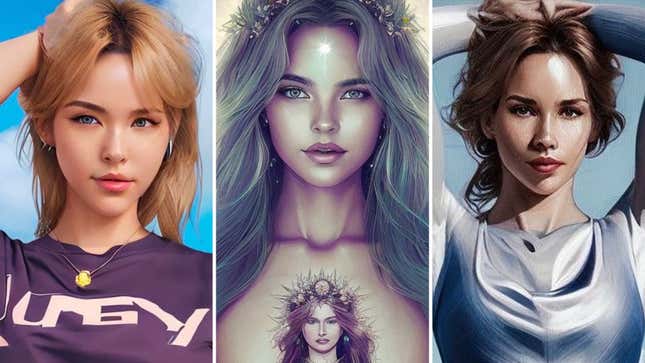Lensa AI and the Trap of Otherworldly Beauty
As technology advances, we continue to envision ourselves further and further outside of our own bodies. That's not necessarily a good thing.
BeautyStyle

Lensa AI is full of red flags. The app, which prompts users to upload photos of themselves then spits out 50+ AI-generated portraits for $3.99, has been decried by artists as predatory to real, human-made artwork. Then, there’s the conundrum of privacy: The “Face Data” users submit can be used by Lensa’s parent company, Prisma AI, to further train its AI’s network, according to ArtNews. And of course, there’s the ease with which Lensa AI is able to transform innocent photos of fully-clothed women or children into AI-generated nudes, heightening concerns around non-consensual porn and deepfakes.
Nevertheless, Victorian women, erotic elves, French royals, and racially ambiguous intergalactic warriors took over social media feeds this week. According to TechCrunch, the app was downloaded 1.6 million times in November, with the U.S. generating 58% of the app’s sales. Women on TikTok posted collages of their ethereal portraits set to audio exclaiming, “how I love being a woman!” Celebrities including Chance the Rapper, MJ Rodriguez, and Sam Asghari also took part, uniting the rich and famous with the middle-class and ordinary in a quest for connection, validation, vanity, or some combination thereof.
Perhaps the inherent aesthetic value some people, especially women, seem to be getting from their Lensa AI portraits is as shallow as wanting to feel pretty. I get that. But what remains perplexing is consumers’ willingness to pay $3.99 for what are ultimately yassified and hyper-feminized representations of themselves that could easily be achieved with an Instagram filter at no cost. You’d be hard-pressed to get me to shell out a single dollar for an app, let alone one that I’d probably use once and delete.
When I posed this question to a few friends, one suggested that the pretension of celebrity is a reason we may be apt to override our better judgment for 50 portraits as glittering fairies—it’s as if someone’s taken the time to make fan art of us. She also wondered if it was “easier to buy into the delusion” that AI ran the numbers and decided, objectively, you were “GORGEOUS,” as opposed to applying a filter, which fashions you complicit in the beautification process. Another friend, Matt West, said his entire feed was a deluge of gay men posting AI thirst traps. “Everyone low key wants to be Rose from the Titanic,” he said.
The idea of magic avatars isn’t new, nor are the insidious implications of AI-generated representations of beauty. What’s different with this latest application of artificial intelligence is our accessibility to it. The vanity and promise of ethereal beauty is surely a fun one. But how might that in turn influence expectations around our faces, bodies, and the modification of both?
“Our current ideal of beauty, specifically in Western culture, specifically at this time in history, means being as divorced from your humanity as possible,” beauty culture critic Jessica DeFino told Jezebel. “These AI drawings have almost no humanity in them: They’re cartoon, digital renderings, created by artificial intelligence without a human hand involved in the making of it all. It just feels very depressingly on track for what our culture considers beautiful.”
@noelleleyva #greenscreen interesting
When DeFino says Lensa is “on track” with current beauty standards, she means that it follows other humanity-shedding trends like glass skin, jello skin, and vampire skin (which aspires to look “undead”). The same literal self-objectification, she said, can be seen within the Instagram face trend, in which consumers try to emulate Instagram and Facetune filters with cosmetics and surgery. AI-inspired beauty, or “meta face” as DeFino calls it, is the next natural step as we navigate between the physical world and the metaverse. Cartoonish in nature, youthful, and devoid of both texture and tone deviation, meta face (inspired by Mark Zuckerberg’s “waxy visage”) and Lensa AI together provide one of the first digital forays into otherworldly aesthetics: How beautiful you might look somewhere—really, anywhere—else without the constraints of gravity and your own humanity.
-

-

-

-

-

-

-

-

-

-

-

-

-

-

-

-

-

-

-

-

-

-

-

-

-

-

-

-

-

-

-

-

-

-

-

-

-

-

-

-








































